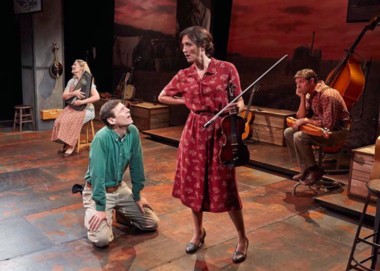In another life, another world, I was a folkie—a singer/songwriter plying the folk clubs in the wake of the folk revival and protest-song movement, one of Woody Guthrie’s multitude of musical progeny. Woody’s work, his example and his songs—“Pastures of Plenty” and “Deportee,” “Union Maid” and “This Land is Your Land” (including the verses omitted from the campfire songbooks, about the “No Trespassing” sign and the relief office)—were an important part of my musical, political and moral education. Some two dozen of those songs, plus some old-time tunes learned literally at his mother’s knee, form the fabric of Woody Sez, the musical biography now at TheaterWorks in Hartford. Much more than a concert and not quite a play, it’s a theatrical journey in which the songs illustrate and illuminate a vivid first-person narrative.
There are four performers, all of them good actors as well as impressive multi-instrumentalists (there are some 30 instruments onstage, from guitars and fiddles to a pennywhistle and a pair of spoons). They are led by David M. Lutken, who semi-impersonates Woody. His lanky frame is nothing like the wiry real-life Woody, and his supple baritone doesn’t try to emulate that rough-edged twang, but his authentic North Texas drawl recalls the man’s Oklahoma roots and his easy rapport with the audience nails Woody’s common touch.
The show begins in 1940, in a radio studio atop Rockefeller Center, where Woody heats up the airwaves with a cheeky talking blues that tweaks New Yorkers, politicians and the Rockefellers. It then backtracks to unfold a chronological life story of hard times and hard traveling, a restless odyssey through hobo camps, picket lines and concert stages, carried on a wave of songs that “comfort the afflicted and afflict the comfortable” and seem to grow right out of the American soil. One of them, “Tom Joad,” a ballad version of The Grapes of Wrath, becomes a framework for Woody’s own journey—the Dust Bowl Okie whose travels and travails gave him an overflowing empathy for hardworking people and a simmering anger at their plight.
Despite the perilous times the songwriter lived and chronicled, the show’s spirit, like most of Woody’s songs, is upbeat but never saccharine. Woody’s life exemplified the power of music to soothe, inspire, unite—and, as the sign pasted to his guitar bragged, to “kill fascists.” His songs, sung in migrant camps and union halls, not only kept people’s hopes up in times of anxiety and despair but connected them to each other, and Woody Sez makes that human connection come alive.
The other three performers give Lutken strong support. David Finch plays four or five instruments and four or five cameo roles, including Woody’s brother-in-arms Pete Seeger. The women put me in mind of two folk legends. Helen J. Russell, with her waterfall-pure singing and ready smile, reminds me of “the mother of folk,” Appalachian singer Jean Ritchie, and Leenya Rideout’s chiseled beauty and crystalline voice evoke a brunette Emmylou Harris. Russell’s enthusiastic spirit drives the show’s sense of celebration, but Rideout, oddly, maintains a cool aloofness that undermines the ensemble feel.
The show really belongs to Lutken, who conceived it and has shepherded it through several versions over the past seven years, including European tours and a West End run. It’s not exactly a touring show, but, like Woody himself, a hard-traveling work-in-progress, each iteration reflecting the spirit of the times and the nature of the audience. The extended run in Hartford is its most complete outing and, on the night I was there, it received the only spontaneous and unanimous standing ovation I’ve seen all season.•
Through Sept. 21, TheaterWorks, 233 Pearl St., Hartford, (860) 527-7838, theaterworkshartford.org.
Chris Rohmann is at StageStruck@crocker.com and his StageStruck blog is at valleyadvocate.com/blogs/stagestruck.



